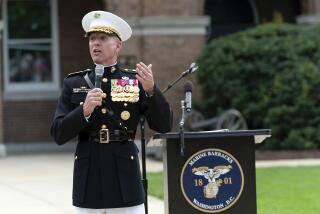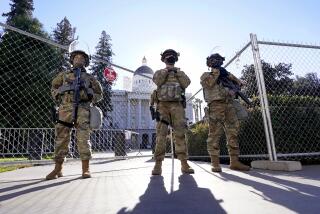Army Lets General in Prison Scandal Retire
WASHINGTON — Maj. Gen. Geoffrey D. Miller, whose oversight of detainee operations at Guantanamo Bay and in Iraq put him under intense scrutiny, was allowed to retire from the Army on Monday, a signal that he will face no disciplinary action in connection with Abu Ghraib abuse scandal.
Miller could be recalled to active duty to face a court-martial if military prosecutors decide to charge him in the abuse of terrorism suspects. But a senior Pentagon official said such a move was unlikely.
“I don’t anticipate that at all,” said the official, who requested anonymity because of the sensitivity of the abuse cases. “Everything I’ve seen, and everything [the Army’s] general counsel and inspector general and [the Pentagon’s] inspector general, everything surrounding Guantanamo and detainee operations has been looked at pretty extensively.”
Miller, 56, had sought to retire in February, but Army Secretary Francis J. Harvey denied his request because of the investigations and courts-martial then underway.
After invoking his right against self-incrimination earlier this year in two of the abuse trials, Miller agreed to testify at a junior officer’s court-martial in May. In his appearance, he denied accusations that he had been the one to suggest that Abu Ghraib guards use military dogs to intimidate detainees.
The senior Pentagon official said the decision to allow Miller to retire was largely based on the fact that the two abuse trials at which he was to testify were finished.
“Had we retired him earlier, people would have always asked questions,” said the senior Pentagon official. “I think everything has been out there, everything’s been looked at.”
A month ago, Miller sent a letter to Sen. John W. Warner (R-Va.), chairman of the Senate Armed Services Committee, informing the panel of his impending retirement and volunteering to return as a civilian and testify at any congressional hearings about detainee abuses.
Warner wrote to Harvey last week, saying that a bipartisan group of committee members had requested a further investigation into whether Miller had lied to Congress about his contacts with senior Pentagon civilians following his mission to Iraq. Warner said he intended to call Miller to testify at a hearing on the issue.
Upon his retirement, Miller was awarded the Distinguished Service Medal, one of the Army’s highest honors.
“He has had a very, very distinguished career,” said Gen. Richard A. Cody, vice chief of staff of the Army. “You talk to soldiers that have served with him -- and when I get ready to retire anybody, I always like to go and get feedback from people -- Geoff is very, very well respected by peers, subordinates and superiors alike.”
Miller long ago emerged as a key figure in the Abu Ghraib abuse scandal, even though he was never formally accused of wrongdoing. He was commander of the U.S. detention complex at Guantanamo Bay, Cuba, when Pentagon officials selected him to lead a team to improve U.S.-run prisons in Iraq as the insurgency began to mushroom during the summer of 2003.
The now-infamous abuses of detainees in Iraq, captured in photographs, began occurring just weeks after Miller’s mission recommended changes to Army Lt. Gen. Ricardo S. Sanchez, who at the time was commander of U.S. forces in Iraq.
A separate Pentagon investigation into interrogation techniques at Guantanamo recommended that Miller be reprimanded for the degrading and abusive interrogation techniques used on Mohammed al-Qahtani, a “high-value” prisoner who U.S. officials believe was the intended 20th hijacker in the Sept. 11 attacks. Qahtani was refused entry to the United States by immigration officials a month before the attacks and was later captured in Afghanistan.
Despite the reprimand recommendation, the general responsible for administering punishment decided not to issue a rebuke, finding that no laws or policies had been violated.
“We think it amounts to torture,” said John Sifton, an attorney at Human Rights Watch, referring to Qahtani’s case. “Geoff Miller should be dealing with lawyers and defense attorneys; he shouldn’t be getting an award.”
Until the Abu Ghraib abuses came to light, Miller was a rising star within the Army and a favorite of Defense Secretary Donald H. Rumsfeld. Top Pentagon civilians praised him for reorganizing the way Guantanamo Bay was run so that it produced more intelligence on Al Qaeda operations.
Human rights groups and some lawmakers have accused Miller of setting up an interrogation system at Guantanamo that tolerated humiliation and abuse of detainees, and then bringing those practices to Iraq. Miller has denied those accusations.
Miller is the second senior officer to see his career derailed by the Abu Ghraib scandal. Sanchez, who turned over control of coalition forces in Iraq to Army Gen. George W. Casey Jr. two years ago, was slated to be appointed the head of U.S. Southern Command after leaving Iraq.
Sanchez’s nomination for the job, which oversees all U.S. military activity in Latin America and requires Senate approval, was scrapped because of fears that his Abu Ghraib ties would sink his Senate confirmation.
More to Read
Sign up for Essential California
The most important California stories and recommendations in your inbox every morning.
You may occasionally receive promotional content from the Los Angeles Times.










